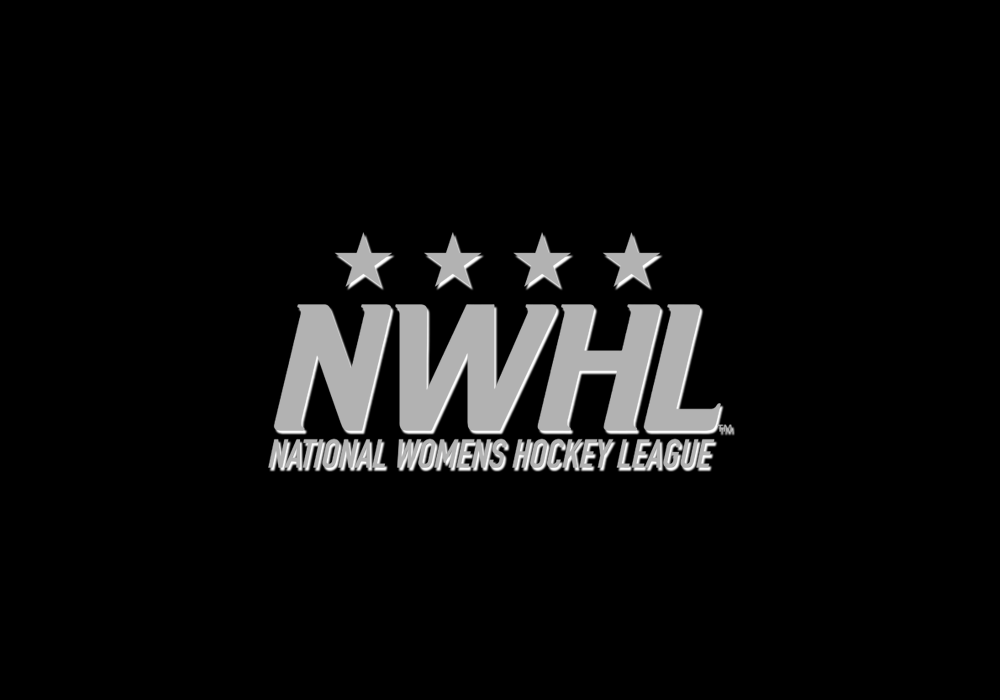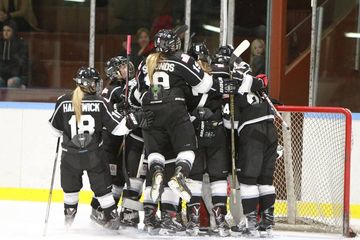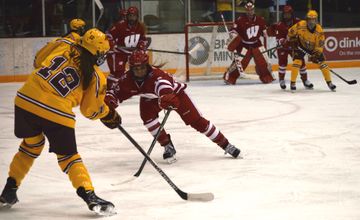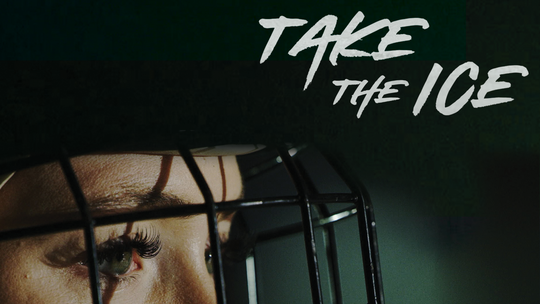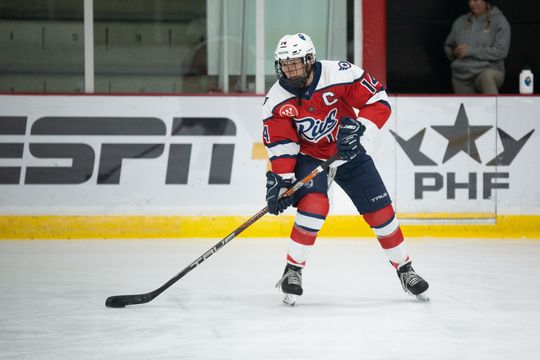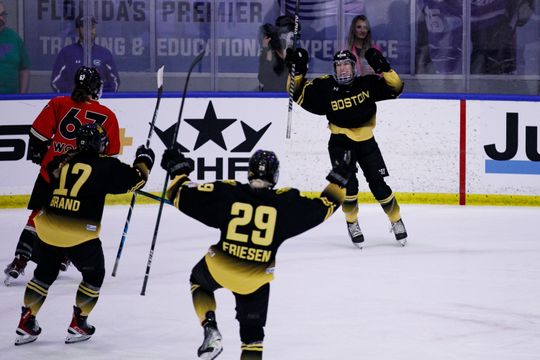On the surface, it appears to be business as usual for the National Women's Hockey League. The league has been off from action since November 20, and recently issued a press release to remind folks of their upcoming games this weekend.
However, this Thursday marks two weeks since the league informed its players of a major, unanticipated pay cut. Players were informed of the cut through their NWHLPA representatives, which is said to be up to sixty percent, and would be required to sign addendums to their contracts, which were initially signed for at least a league minimum of $10,000.
Just a few days after the cuts were announced, the teams had games scheduled to play, and they did. Players took the ice in what was called a "good faith showing," but the effects of the recent announcement were clearly evident in the post-game media scrum atmosphere.
Shortly afterwards, the players released a list of information that they were requesting from the league. The requests included proof of valid insurance coverage; an independent, third-party audit of the NWHL's finances; the identities of the league's investors; and an explanation regarding the league's quickly diminishing revenues.
As of December 1, we aren't sure how many of those requests have been fulfilled. Per sports agent Brant Feldman, both the Boston Pride and Connecticut Whale received proof of insurance, and New York Riveters alternate captain Madison Packer clarified that her team had also gotten confirmation of the coverage.
Other than that, it's been quiet -- up until the league's reminder email about the return to action this weekend. With that, there are still a lot of questions that appear to still be unanswered.
It's unclear at this point which players have, and have not, signed addendums to their contracts. As such, it's not clear which players will be skating in this weekend's games, or who will be returning to the league at all -- huge questions, especially considering that the league has three games on tap for this weekend.
With that come more questions. What happens to the players who refuse to sign the contract addendums? (No clear answer was given to this question during the conference call with the league on November 18.)
Many players undoubtedly found themselves between a rock and a hard place -- having to either accept a major pay cut, which comes with many other problems, including being able to afford rent and food -- or not accepting it, and possibly not being able to play in the league anymore.
We've already seen some partial fallout from this decision, as Sportsnet's Kristina Rutherford recently tweeted that Buffalo Beauts forward Harrison Browne and his teammates can no longer afford their rent, which has forced Browne to move home to Canada and commute to the games.
How does 50% pay cut in @NWHL affect players? Harrison Browne & teammates can't afford rent now. He's moving home to Canada & will commute.
— Kristina Rutherford (@KrRutherford) November 26, 2016
Beyond the addendums and actual contracts/pay cuts, though, other questions remain. Who are the league's investors -- and when will players be given the level of transparency they've asked for (and rightfully deserve)? Have the league's finances been audited, and if not, when will that audit be completed? We know that some people previously identified as investors have pulled out, such as Michael Moran and George Spiers, and have threatened legal action.
What happens if enough players refuse to sign, or refuse to play without their requests being met, and teams are thus unable to field full rosters (or rosters full enough to field any semblance of a team)? Do the games still get played, or will they be postponed or cancelled altogether? (With all of this come other questions, including when it's appropriate and necessary to make these decisions and to let fans know, in order to adjust their travel and other plans, and when rinks need to be made aware, in order to allow their staff proper time to either come to work, or not.)
All of these interconnected aspects bring larger questions about the league and its future, which seems to depend, at least in part, on a lot of the aforementioned points.
Another thing I want to mention -- since it certainly ties into this conversation: mainstream media coverage of the league, or more often, lack thereof.
Attendance was brought up as one of the points where the league hasn't met its expectations; with proper media coverage, the NWHL could see a huge boost in attendance at games. But more often than not, coverage is sporadic and unreliable. Several media outlets which have normally minimally covered the league are now jumping on the chance to report on the league's troubles, which is another issue in and of itself.
Take for instance The Buffalo News, the major newspaper in Buffalo, NY. They have rarely covered the NWHL and the Beauts. Much of the game coverage has been via "staff reports", with basic data taken from the league's scoresheets and nothing else of substance.
When Harrison Browne came out as the first transgender athlete in the NWHL, The Buffalo News jumped on the story, publishing not one, but two articles about Browne. While this coverage is important and Browne's story is an extremely newsworthy one to cover, the league itself (and the Beauts) should be regularly covered as well.
As the season went on, The Buffalo News' coverage continued sporadically. The weekend of November 12th, the newspaper posted a staff report about the Beauts' Saturday loss. The next day, the Beauts captured their second win of the season -- and there was absolutely no coverage of it in the newspaper.
When the news broke about the league's pay cuts, The Buffalo News once again jumped on the story, posting two pieces about it. When there's a controversy, the big media shows up; but the games themselves are given little to no attention whatsoever.
The Buffalo News isn't the only example of this. The New York Times has published several stories about the league in the past, including pieces about Amanda Kessel and the Riveters. But there is no consistent coverage there. You can bet they were on it with the Browne story, and the news of the league's pay cuts, though. Without providing additional coverage of the league, the paper's attention to these stories comes off as exploitative at best.
The Fourth Period, an online hockey lifestyle magazine, had seemingly published exactly zero articles about the NWHL, but were quick to post one entitled "NWHL Hit With Bad News" early on November 18 and were, in fact, the ones to break the news publicly of the league's pay cuts. But had they covered the league prior? No -- but as soon as things started going down, they were there.
The Hockey Writers hadn't posted anything about the NWHL since October 19th -- a recap of the Riveters' opening game -- but when the salary news broke, they were sure to write about it.
It's frustrating to see these media outlets, and others, providing only minimal coverage of the league on a regular basis and then jumping to cover a big, breaking story, particularly a negative one.
It would be unfair to criticize media coverage without mentioning the other side of things: the league's media relations, which also need some work. Prior to the season, media members were e-mailed a list of media regulations, many of which have fallen by the wayside since the season began. Among these regulations: pre-game coach availability, which hasn't actually happened at a single Buffalo Beauts home game.
In the same vein, the league has finally begun handing out scoresheets throughout the games, listing each goal, assist, etc. But this has been sporadic, and the stats sheets are often inaccurate (both paper and online). This certainly makes coverage more challenging, and improvements in the league's media relations can only help further fair coverage of the league in the future. And with consistent, solid coverage, particularly from some of the bigger outlets, the game can be expected to grow, with more fans in attendance. The league may not have a budget for things like television commercials or print ads, but basic newspaper/other media coverage can be a great advertising tool -- if you work with the folks providing that coverage and allow them to do their jobs.
Above all these other things, the biggest point to remember: Without the players, this league doesn't exist.
The NWHL players suiting up every week for games aren't robots, nor should they be bound by a sense of duty. They deserve to be paid a living wage and have the right to ask for what they want, whether that's financially or in terms of information. They also deserve the freedom to walk away if they are unhappy, without judgment or retribution.
The league is more than just entertainment; it exists not just for the fans who watch it, but for the incredible players who deserve to be treated with respect. It exists not just for the future women's hockey players, the kids watching the league in hopes of what is to come -- but for the players who are putting their all into every game, now, and making names for themselves as professional athletes.
What happens from here? We honestly have no idea at this point, though the league, at least on the surface, appears to be planning to go ahead with the games as scheduled this weekend. For now, we have to take it one day -- and maybe even one hour -- at a time.
